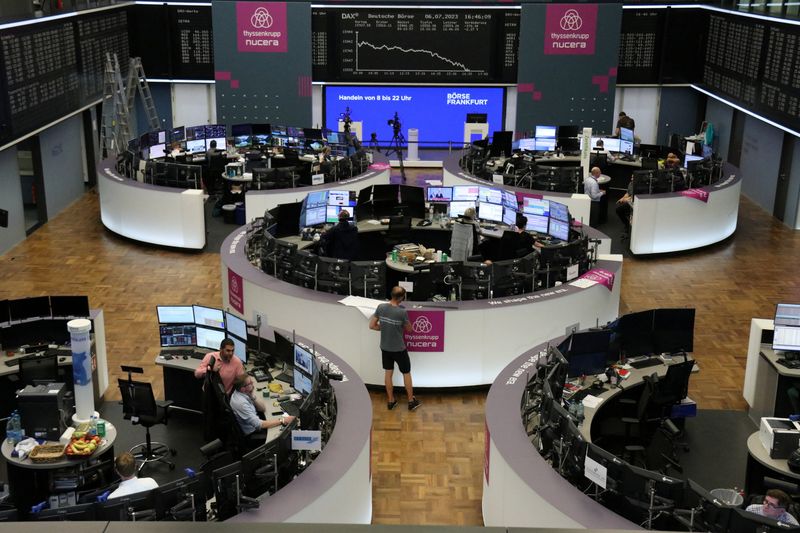By Joice Alves
LONDON (Reuters) - A lack of clarity on Beijing's planned stimulus measures will mean a mixed appetite for European stocks over the rest of 2023, investors say, with China the EU's third biggest export market.
From high-end cars to luxury watches, Europe's consumer discretionary and staples, technology, industrials and materials sectors all have significant revenue exposure to China.
So with a post COVID-19 recovery in the world's second-largest economy losing momentum, investors are eager for details on policy support promised by Beijing to spur growth.
Lifting COVID restrictions in China was one of the key drivers of a rally in European equities earlier this year, but its economy is now sputtering.
Services activity in China expanded at the slowest pace in five months in June, while factory activity declined for a third straight month in June.
China faces challenges on many fronts, including a shrinking and aging population, debt-laden local governments, a property downturn and renewed geopolitical tensions.
"China reopening will likely be a headwind when they were actually a major tailwind in the first five months of the year," said Karim Chedid, Head of the Investment Strategy for iShares at BlackRock (NYSE:BLK) for EMEA.
"But let's see if the policy stimulus changes things."
European equities have responded accordingly.
The MSCI Europe index rose 10% in the first quarter, but by just 1% in the second, before it began declining as the outlook clouded.
China, the European Union's third biggest export market after the U.S. and Britain, accounts for some 15% of the sales of companies in the MSCI UK and MSCI Germany indices, Barclays (LON:BARC) calculates. French, Swedish and Swiss sales to China are 10%.
The EU exported more than 70 billion euros of products to China from January to April, figures released in June showed.
Clingendael, a Dutch think tank, estimated that last year, more than half of Rio Tinto (NYSE:RIO)'s revenues came from China, the world's biggest importer of raw materials. Rio's shares have declined more than 12% so far this year.
On the consumer front, Clingendae estimates one third of luxury watchmaker Richemont's revenues; a fifth of sports apparel company Adidas (OTC:ADDYY) revenues and a fifth of luxury carmaker BMW revenues came from China.
Emmanuel Cau, head of European equity strategy at Barclays, who in May recommended taking some profit on China-sensitive stocks, upgraded the highly China-exposed European mining sector after the government unveiled stimulus measures.
"Better news in China now should be good news for Europe too," Cau said.
But BlackRock's Chedid is not convinced policy measures, which include interest-rate cuts, will be a game-changer.
WHICH STIMULUS?
Sources involved in policy discussions told Reuters that China's stimulus will target shoring up weak demand in the consumer and private sectors.
Barclays economists expect any policy support in China to be mostly focused on supporting demand in services and boosting investment across technology, manufacturing and infrastructure, especially around data centres and green energy.
Goldman Sachs (NYSE:GS) economists believe headwinds in China will likely persist, as moderate policy easing this year will only partially offset challenges from the property market and what they call consumers' and entrepreneurs' pervasive pessimism.
The bank expects real GDP growth in China to accelerate to 5.4% year-on-year, compared to a global rate of growth of 2.4%, 1.8% in the U.S. and 0.5% in the euro area.
Fahad Kamal, chief investment officer at SG Kleinwort Hambros, said data from China has disappointed because expectations were too high. He continued to overweight European equities, and trimmed his exposure to China's mid market.
"It's still pretty good. The Chinese economy is on track to grow by 5% this year. It's the world's second largest economy! What would we give for the UK, or the U.S., or Europe to grow by 5%?" he said.
Luxury stocks have seen resilient demand, with shares in LVMH, Europe's largest company by market value, up around 25% this year. LVMH, gets a quarter of its revenues from China.
Richemont, Burberry and Moncler, which each make a third of their revenue in China, are all up between 10% and 20% this year.
Shares in semiconductor company BE Semiconductor Industries, which according to Barclays makes around 40% of its revenues in China, have surged almost 70% this year.

Kevin Thozet, a member of the investment committee at Carmignac, said there will likely only be more fiscal stimulus in September or October.
"They (the Chinese government) will need to see more pain in the economy (and) more deterioration in the labour market before they do that," he said.